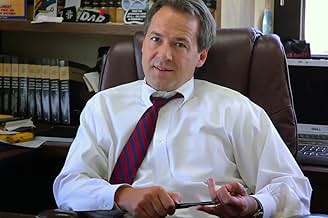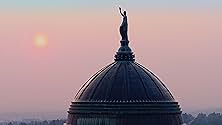Aggiungi una trama nella tua linguaIt's about thwarting any election that is against progressives.It's about thwarting any election that is against progressives.It's about thwarting any election that is against progressives.
- Regia
- Sceneggiatura
- Star
- Premi
- 4 vittorie e 14 candidature totali
Steve Bullock
- Self - Governor of Montana
- (as Gov. Steve Bullock)
Recensioni in evidenza
Even Open Secrets shows less than 10% of "Dark Money" is corporate. More of it is from unions and the MOST is from foundations and supposed charities that are actually highly political.
This is lousy reporting leaving out 90% of a phenomena because the data show the large majority of corporate money goes to Democrats.
Nice documentary on US political campaign contributions and disclosure laws
I'll just get this out of the way: I believe that 'Citizens United' in effect suppresses the free speech of real citizens. So yeah, I am biased. Having said that, this is not a review of the subject but a review of the documentary itself. And, all things considered, "Dark Money" is honestly a pretty middle-of-the-road documentary.
Here's what I liked about it: I don't live in Montana so it was interesting to learn a little about the state's history and about their local politics. I also have to commend the filmmakers for taking on a decidedly non-sexy issue that is easy to overlook. The film also speaks to individuals with a range of political backgrounds and ideologies, although there's limited representation of the "dark money" interests themselves for obvious reasons (interest which, it must be said, are often not corporations directly but wealthy individuals with strong corporate leanings).
Here's what I didn't like: the film drags in many spots. The same ideas end of being restated multiple times. The numerous individuals and organizations involved can be difficult to keep track of. The documentary would have been stronger by focusing in on just a few individuals rather than trying to tell a universal story. The film's term "dark money" also combines a number of related yet distinct concepts, such as: campaign finance, political action committees, disclosure, corporate influence, campaign coordination, and good old fashioned political corruption. Again I feel the film's argument would have been stronger if they have focused on a specific case instead making more nebulous, universal arguments.
Overall, I also just don't think this documentary will change anyone's opinion. Those who dislike "dark money" will like the film because it confirms what they already believe. Those who view "Citizens United" as a win for free speech, will dismiss this film as biased. And the depressing truth is that those citizens who can be swayed by random political mailers are never going to watch a rather boring documentary, no matter how important the subject it covers is.
Given the polarized nature of our nation at the moment, maybe the sad truth is that it's just too much to expect any documentary to change anyone's mind. Still, I can't help but feel a more deft documentary on the subject of "dark money" could have, at the very least, gotten a few more people thinking about these issues and what they mean for our democracy.
Here's what I liked about it: I don't live in Montana so it was interesting to learn a little about the state's history and about their local politics. I also have to commend the filmmakers for taking on a decidedly non-sexy issue that is easy to overlook. The film also speaks to individuals with a range of political backgrounds and ideologies, although there's limited representation of the "dark money" interests themselves for obvious reasons (interest which, it must be said, are often not corporations directly but wealthy individuals with strong corporate leanings).
Here's what I didn't like: the film drags in many spots. The same ideas end of being restated multiple times. The numerous individuals and organizations involved can be difficult to keep track of. The documentary would have been stronger by focusing in on just a few individuals rather than trying to tell a universal story. The film's term "dark money" also combines a number of related yet distinct concepts, such as: campaign finance, political action committees, disclosure, corporate influence, campaign coordination, and good old fashioned political corruption. Again I feel the film's argument would have been stronger if they have focused on a specific case instead making more nebulous, universal arguments.
Overall, I also just don't think this documentary will change anyone's opinion. Those who dislike "dark money" will like the film because it confirms what they already believe. Those who view "Citizens United" as a win for free speech, will dismiss this film as biased. And the depressing truth is that those citizens who can be swayed by random political mailers are never going to watch a rather boring documentary, no matter how important the subject it covers is.
Given the polarized nature of our nation at the moment, maybe the sad truth is that it's just too much to expect any documentary to change anyone's mind. Still, I can't help but feel a more deft documentary on the subject of "dark money" could have, at the very least, gotten a few more people thinking about these issues and what they mean for our democracy.
I watched this documentary based on the recommendation of a national publication, and found it well-done, absorbing, and critically important to democratic politics. True, it's not like, say, a nature documentary with exciting visual scenes, but is essentially a series of revealing interviews with lawyers and politicians, and a few journalists. The film effectively uses local politics in Montana to depict the erosion of democracy from unrestrained campaign finance, particularly from front groups who serve to hide the identity of national advocacy groups who are actually providing the cash, the "dark money" in the title. Montana has one of the more strict campaign finance laws, stemming as we learn from the days of the "Copper Kings" when Anaconda and other copper mining firms essentially purchased state legislators and newspapers, and we see in this film how state politicians, both Democrats and (moderate) Republicans, try to preserve this modest protection from the dreadful effects of the Citizens United court case which has unleashed torrents of money in our elections whose sources needn't be identified. The film ends with the conviction of a state legislator who has received large amounts of campaign funds and advice from out-of-state groups that, in a hidden manner, front for "right-to-work" (i.e., anti-labor union) advocacy groups.
Some politically conservative national observers who I respect claim the Citizens United case removed restraints on "free speech" in the political arena imposed on corporations and trade groups (and labor unions), allowing them to use as much of their resources as they desire to influence (i.e., engage in "free speech") elections and legislation. I firmly believe that too much money in politics, especially from hidden sources, is anti-democratic and makes political decision-making beholden to the "donor class." The Koch brothers, for example, have many avenues for advocacy (free speech); their Americans for Prosperity distributes all kinds of information around the U.S. and they acquired the Cato Institute, an influential Washington think tank. Why let them, conceivably, purchase legislators through unlimited campaign donations? Finally, as this film implicitly shows, campaign finance money has a greater impact on state and local elections since there's greater name recognition for candidates in U.S. Senate and national elections.
Some politically conservative national observers who I respect claim the Citizens United case removed restraints on "free speech" in the political arena imposed on corporations and trade groups (and labor unions), allowing them to use as much of their resources as they desire to influence (i.e., engage in "free speech") elections and legislation. I firmly believe that too much money in politics, especially from hidden sources, is anti-democratic and makes political decision-making beholden to the "donor class." The Koch brothers, for example, have many avenues for advocacy (free speech); their Americans for Prosperity distributes all kinds of information around the U.S. and they acquired the Cato Institute, an influential Washington think tank. Why let them, conceivably, purchase legislators through unlimited campaign donations? Finally, as this film implicitly shows, campaign finance money has a greater impact on state and local elections since there's greater name recognition for candidates in U.S. Senate and national elections.
10dhubin
My wife and I watched this marvelous documentary at the Sundance Film Festival last night. It is extremely well done and it presents a compelling narrative about the role of "dark money" (political funds that cannot be traced to their source) in contemporary American politics. Flawed campaign financing laws lie at the heart of many of our difficult political problems. Kudos to Kimberly Reed and everyone involved in producing this gem.
I più visti
Accedi per valutare e creare un elenco di titoli salvati per ottenere consigli personalizzati
Dettagli
- Data di uscita
- Paese di origine
- Sito ufficiale
- Lingua
- Celebre anche come
- Тёмные деньги
- Luoghi delle riprese
- Aziende produttrici
- Vedi altri crediti dell’azienda su IMDbPro
Botteghino
- Lordo Stati Uniti e Canada
- 217.932 USD
- Fine settimana di apertura Stati Uniti e Canada
- 8100 USD
- 15 lug 2018
- Lordo in tutto il mondo
- 217.932 USD
- Tempo di esecuzione1 ora 39 minuti
- Colore
Contribuisci a questa pagina
Suggerisci una modifica o aggiungi i contenuti mancanti

Divario superiore
By what name was Dark Money (2018) officially released in India in English?
Rispondi




































